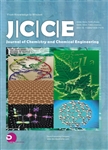Electrochemical Polymerization of Acrylamide Film on Mild Steel Electrode for Corrosion Protection
Electrochemical Polymerization of Acrylamide Film on Mild Steel Electrode for Corrosion Protection作者机构:Chemistry Department Faculty of Science Kafer El-Sheikh University Kafer El-Sheikh 33511 Egypt
出 版 物:《Journal of Chemistry and Chemical Engineering》 (化学与化工(英文版))
年 卷 期:2010年第4卷第6期
页 面:35-43页
学科分类:081704[工学-应用化学] 07[理学] 08[工学] 0817[工学-化学工程与技术] 070305[理学-高分子化学与物理] 080501[工学-材料物理与化学] 0805[工学-材料科学与工程(可授工学、理学学位)] 080502[工学-材料学] 0703[理学-化学]
主 题:Polyacrylamide electrochemical potentiodynamic impedance protection.
摘 要:Polyacrylamide (PAM) film was electrosynthesized on mild steel by cyclic voltammetry using Ce (IV) salt-oxalic acid as supporting electrolyte. Polymerization was initiated by a free radical that was formed by the fast reaction of oxalic acid and Ce (IV). The electrolysis of the reaction solution resulted in regeneration of Ce (IV), which could oxidize oxalic acid to produce radicals. The effect of temperature on the yield of electroinitiated polymerization was performed. The potential sweep rates were changed to achieve the polymer film with different thickness. Protective properties of the PAM film for corrosion of mild steel in 1 M NaCI aqueous solution were investigated by potentiodynamic polarization curves and electrochemical impedance spectroscopy (EIS). The structure of PAM film on mild steel was investigated by using physicochemical methods such as elemental analysis of C, H, N, physical chemical methods and FTIR spectrometer. The influence of scan repetition and scan rate on the formation of polymer film was studied at a current density of 1 mA/cm2. The results of these studies reveal that the corrosion resistance of the PAM-coated mild steel was significantly higher and the corrosion rate was considerably lower than that of uncoated steel. The PAM film was formed with lower sweep rate leading to more positive shift of corrosion potential and greater charge transfer resistance, reflecting higher inhibition for corrosion of the mild steel.



